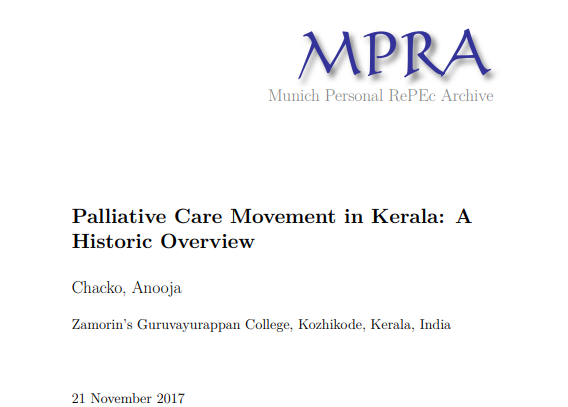Understanding caregiver burden and quality of life in Kerala’s primary palliative care program: a mixed methods study from caregivers and providers’ perspectives
The study explores the caregiver burden and quality of life (QoL) among caregivers of palliative care patients in Kerala, India, with a particular focus on aging caregivers. Kerala’s decentralized health governance system, which has been operating for almost three decades, has pioneered a community-driven approach to palliative care. This program heavily depends on family caregivers, who face numerous challenges, including physical, psychological, social, and financial burdens. Despite these challenges, caregiver issues remain under-addressed in the program’s design and implementation.
A mixed-methods approach was adopted, combining a cross-sectional survey of 221 caregivers and in-depth interviews with caregivers and palliative care nurses. The survey utilized tools such as the Achutha Menon Centre Caregiver Burden Inventory and EuroQol EQ-5D-5L to measure caregiver burden and QoL. Qualitative data were obtained through interviews with caregivers and nurses, exploring their perceptions and experiences. Data collection took place in five randomly selected panchayats in Kollam district, Kerala. Quantitative analysis included statistical comparisons across age groups, while qualitative data were manually coded and thematically analyzed.
Older caregivers (60 years and above) constituted 28.1% of the sample and experienced significantly poorer health-related QoL, particularly when burden levels were high. The study found a mean utility score of 0.877 for older caregivers with high burden, compared to 0.980 for younger caregivers with low burden. Older caregivers were more likely to report mobility issues, chronic pain, and anxiety or depression. They often cared for their spouses and faced challenges related to isolation and pre-existing health conditions.
In contrast, younger caregivers (18-59 years) generally had better QoL but reported lower levels of caregiving satisfaction. Caregiving responsibilities often involved doing "everything" for the patient, including personal care, medication management, and psychological support. This multidimensional burden was exacerbated by societal expectations and limited external support.
Palliative care nurses recognized the caregiver burden but lacked systematic interventions to address it. Their focus remained predominantly on patient care, with caregivers seen as secondary participants in the caregiving process. Training and practical support for caregivers were limited, and systemic barriers such as time constraints and inadequate resources hindered more comprehensive caregiver support.
The study highlighted significant gaps in addressing caregiver issues within Kerala’s palliative care program. Despite local government (LG)-run initiatives, caregiver-specific interventions were minimal. Some LGs provided food kits, assistive devices, and financial aid, but these were reactive rather than proactive measures. Nurses often referred caregivers to existing state welfare schemes, though these were inconsistently implemented.
Caregiving in Kerala is influenced by age, gender roles, and socioeconomic status. Older caregivers, particularly women, are disproportionately affected, experiencing compounded burdens of caregiving and age-related health issues. Cultural norms often dictate caregiving as a familial obligation, which can lead to neglect of the caregivers’ own health and well-being. The study underscores the need for equitable distribution of caregiving resources and targeted interventions to alleviate caregiver burden.
To improve outcomes for both patients and caregivers, the study suggests implementing respite care services, caregiver training programs, and peer support groups. It also recommends integrating caregiver assessments into the palliative care framework and strengthening local governance structures to address caregiver needs proactively. Enhancing community-based support systems and fostering partnerships between caregivers, nurses, and LGs could further mitigate caregiver challenges.
This study provides critical insights into the caregiver dynamics within Kerala’s palliative care system. It highlights the pressing need for systematic caregiver support and tailored interventions, particularly for older caregivers, to ensure sustainable caregiving practices and improved quality of life for all stakeholders.




Comments
Post a Comment